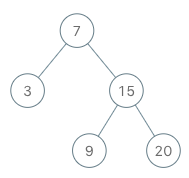173. Binary Search Tree Iterator
1. Description
Implement the BSTIterator class that represents an iterator over the in-order traversal of a binary search tree (BST):
- BSTIterator(TreeNode root) Initializes an object of the BSTIterator class. The root of the BST is given as part of the constructor. The pointer should be initialized to a non-existent number smaller than any element in the BST.
- boolean hasNext() Returns true if there exists a number in the traversal to the right of the pointer, otherwise returns false.
- int next() Moves the pointer to the right, then returns the number at the pointer.
Notice that by initializing the pointer to a non-existent smallest number, the first call to next() will return the smallest element in the BST.
You may assume that next() calls will always be valid. That is, there will be at least a next number in the in-order traversal when next() is called.
2. Example
Example 1:
Input
[“BSTIterator”, “next”, “next”, “hasNext”, “next”, “hasNext”, “next”, “hasNext”, “next”, “hasNext”]
[[[7, 3, 15, null, null, 9, 20]], [], [], [], [], [], [], [], [], []]
Output
[null, 3, 7, true, 9, true, 15, true, 20, false]
Explanation
BSTIterator bSTIterator = new BSTIterator([7, 3, 15, null, null, 9, 20]);
bSTIterator.next(); // return 3
bSTIterator.next(); // return 7
bSTIterator.hasNext(); // return True
bSTIterator.next(); // return 9
bSTIterator.hasNext(); // return True
bSTIterator.next(); // return 15
bSTIterator.hasNext(); // return True
bSTIterator.next(); // return 20
bSTIterator.hasNext(); // return False
3. Constraints
- The number of nodes in the tree is in the range [1, $10^5$].
- 0 <= Node.val <= $10^6$
- At most $10^5$ calls will be made to hasNext, and next.
4. Follow Up
- Could you implement next() and hasNext() to run in average O(1) time and use O(h) memory, where h is the height of the tree?
5. Solutions
My Accepted Solution(Follow Up)
h is the height of i_root
Time complexity(next() Average): O(1)
Time complexity(hasNext() Average): O(1)
Space complexity(next() Average): O(h)
Space complexity(next() Average): O(h)
// we can't use morris traversal since an iterator should never change the container
class BSTIterator {
public:
// BSTIterator(TreeNode* root)
BSTIterator(TreeNode* i_root) : nextNode(i_root) {}
int next() {
while (nextNode) {
leftChildNodes.push(nextNode);
nextNode = nextNode->left;
}
auto requiredNode = leftChildNodes.top();
leftChildNodes.pop();
int requiredValue = requiredNode->val;
nextNode = requiredNode->right;
return requiredValue;
}
bool hasNext() {
return nextNode || !leftChildNodes.empty();
}
private:
TreeNode* nextNode;
stack<TreeNode*> leftChildNodes;
};